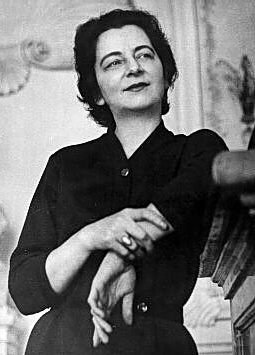Grażyna Bacewicz facts for kids
Grażyna Bacewicz (born February 5, 1909 – died January 17, 1969) was a famous Polish composer and violinist. She was one of the first Polish women to become well-known internationally for her music.
Quick facts for kids
Grażyna Bacewicz
|
|
|---|---|

Grażyna Bacewicz before World War II
|
|
| Background information | |
| Born | February 5, 1909 Łódź, Poland |
| Died | January 17, 1969 (aged 59) Warsaw, Poland |
Contents
Grażyna Bacewicz's Early Life and Studies
Grażyna Bacewicz was born in Łódź, Poland. Her father and brother were also musicians. Her father, Wincenty Bacewicz, taught Grażyna her first piano and violin lessons.
In 1928, she began studying at the Warsaw Conservatory. She learned violin, piano, and how to compose music. She graduated in 1932 as a talented violinist and composer.
She then went to Paris, France, to continue her studies. A famous musician, Ignacy Jan Paderewski, gave her money to attend the École Normale de Musique. She studied composition there with Nadia Boulanger. Later, she returned to Paris to study violin with Carl Flesch, a Hungarian violinist.
Her Career as a Musician and Composer
After finishing her studies, Grażyna Bacewicz performed often as a soloist. She also shared her own compositions and helped judge music competitions. From 1936 to 1938, she was the main violinist for the Polish Radio Orchestra. This job allowed her to hear many of her own musical pieces played by the orchestra.
During World War II, Grażyna Bacewicz lived in Warsaw. Even during the war, she kept composing music. She also performed in secret concerts held underground. At one of these concerts, she played her new piece, "Suite for Two Violins," for the first time.
Family Life and Later Years
Grażyna Bacewicz also had a family. She got married in 1936. In 1942, she had a daughter named Alina Biernacka, who later became a well-known painter. After the Warsaw uprising, they had to leave their destroyed city. They found a temporary home in Lublin.
After the war, she became a professor at the Academy of Music in Łódź. At this time, she started focusing more on composing music. She won many awards and received requests to write new pieces. From 1954, composing became her full-time job. This was also the year she was seriously hurt in a car accident. Grażyna Bacewicz passed away from a heart attack in 1969 in Warsaw.
Grażyna Bacewicz's Musical Works
Grażyna Bacewicz wrote many pieces, especially for the violin. She composed seven violin concertos, which are like conversations between a solo violin and an orchestra. She also wrote five sonatas for violin and piano. A sonata is a piece for one or two instruments.
She created seven string quartets, which are pieces for four string instruments. She also wrote two piano quintets, which are for a piano and four other instruments. Her orchestral works included four symphonies and a Symphony for Strings.
Music for Solo Instruments
Grażyna Bacewicz wrote many pieces for a single instrument. These included works for solo violin and piano. Some of her piano pieces include "Four Preludes" and "Children's Suite." She also wrote "Sonata for violin" which was first played in a secret concert during the war.
Music for Small Groups of Instruments
She also composed chamber music, which is for a small group of instruments. Her "Quintet for flute, oboe, clarinet, bassoon and horn" won a prize in Paris in 1933. She wrote seven string quartets, which are very important in classical music. Her "String Quartet No. 4" won first prize in a competition in Belgium.
Music for Orchestra
Grażyna Bacewicz wrote many pieces for a full orchestra. These are called orchestral works. Her "Concerto for String Orchestra" won a Polish State Prize in 1950. She also wrote "Music for strings, trumpets, and percussion," which won an award in Paris.
Concertos for Solo Instruments and Orchestra
She wrote many concertos, which feature a solo instrument playing with an orchestra.
- Violin Concertos: She wrote seven concertos for violin and orchestra. Her "Concerto No. 7 for Violin and Orchestra" won a gold medal in Brussels.
- Other Concertos: She also wrote concertos for viola, cello, and piano. Her "Concerto for Piano and Orchestra" won a prize in a Chopin competition. She even wrote a concerto for two pianos and orchestra.
Music for Voices
Grażyna Bacewicz also composed music for singers. She wrote songs for voice and piano, like "Three Arabic Songs." She also wrote music for choirs and orchestras, such as the "Olympic Cantata." This piece won an award at the Olympic Arts Competition in London in 1948.
Music for Stage and Film
She created music for ballets, like "Z chłopa król" (Peasant King). She also wrote a radio opera called "The Adventure of King Arthur." Her music was used in animated films and for plays.
Awards and Special Recognitions
Grażyna Bacewicz received many awards for her amazing musical talent.
- 1933: First prize in Paris for her "Quintet for Wind Instruments."
- 1949: Second prize in a Chopin Composition Competition for her "Piano Concerto."
- 1951: First Prize at an international competition in Liege for her "String Quartet No. 4."
- 1960: An award at the International Rostrum of Composers in Paris for her "Music for strings, trumpet and percussion."
- 1965: A prize from the Belgian Government and a gold medal for her "Violin Concerto No. 7."
She also received awards for her lifetime achievements. These included the Order of the Banner of Work and the Order of Polonia Restituta. In 2009, on the 100th anniversary of her birth, the Polish Post issued a special stamp with her picture on it.
See also
 In Spanish: Grażyna Bacewicz para niños
In Spanish: Grażyna Bacewicz para niños
 | Selma Burke |
 | Pauline Powell Burns |
 | Frederick J. Brown |
 | Robert Blackburn |

